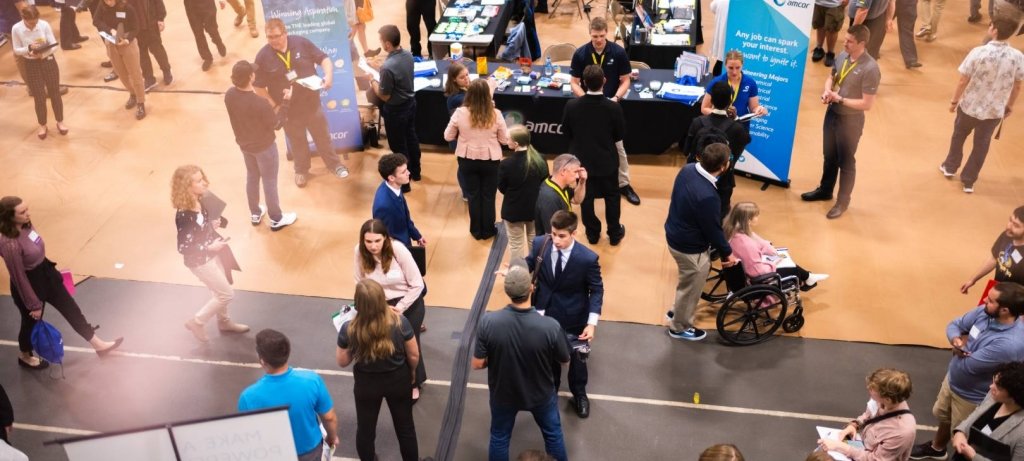The latest Michigan Technological University speaker series presented by the Institute for Policy, Ethics, and Culture (IPEC) will lead community members to a deeper examination of work life, now and in the future.
The Work in Transition lecture series features three livestreamed virtual talks with Q&A sessions on three consecutive Tuesdays: March 14, 21 and 28. On Thursday, March 16, there’s a live event at the Rozsa Center for the Performing Arts, which will also be livestreamed for those who can't attend in person. All events begin at 7 p.m. and are free and open to the public.
Contrary to the adage, there is something else as inevitable as death and taxes: Most people need to work in order to provide life’s essentials and extras for themselves and their families. The series tackles the topic — from how to prepare for the workplace of tomorrow to quiet quitting — with the help of thought leaders. They include professors with TED Talks and popular books, social media influencers, a lawyer and a poet-musician. Following each presentation, Michigan Tech faculty members will lead discussions, with audience participation moderated by Michael Stanitis, program coordinator at Portage Lake District Library.
Get Your Free Reads

As it has since IPEC began its Transition series in 2021, Portage Lake District Library is again offering free books that complement the series and enhance the communitywide conversation. You don’t need to be a library member to participate; just stop in and choose from the selections on display.
Book Titles Available:
- “Work: A Deep History from the Stone Age to the Age of Robots,” by James Suzman
- “Atlas of AI: Power, Politics, and the Planetary Costs of Artificial Intelligence” by Kate Crawford
- “The New Breed: What Our History with Animals Reveals About our Future with Robots” by Kate Darling
- “As We Have Always Done: Indigenous Freedom Through Radical Resistance," "Noopiming (The Cure for White Ladies)” and “Dancing On Our Turtle’s Back: Stories for Nishnaabeg Re-Creation” by Leanne Simpson
- “Quit: The Power of Knowing When to Walk Away” by Annie Duke
IPEC Director Jennifer Slack, distinguished professor of communication and cultural studies in Michigan Tech’s Department of Humanities, said the lecture series is designed to help participants explore the transforming world of work from key perspectives: the history of work, the emergence of new forms of work, the challenges of the new workplace, and what work might look like in the context of building a better world.
“Almost everything about the working world is in flux,” said Slack. “Jobs once valued, skilled and reliable have shifted to an international workforce, automation, robots, computers and artificial intelligence (AI). Training for a career no longer means that will be your career for life.”
"The series creates a narrative about work in transition."

Intelligent Use of AI, TikTok'd Work Tips, and World-building
Here's a rundown of the sessions. You can register in advance for the livestreamed events.
Tuesday, March 14, virtual event: “The History of Work,” with anthropologist and author James Suzman, is designed to challenge assumptions about who we believe we are in relation to work. Suzman’s book, “Work: A Deep History from the Stone Age to the Age of Robots,” is one of several available at no charge from Portage Lake District Library.
A discussion with Suzman about how work has evolved through the ages and why we might want to influence the direction it takes in the future will be led by Jennifer Rachels, adjunct instructor and Ph.D. candidate in environmental and energy policy at MTU. Rachels’ dissertation topic is “Blue Collar Jobs in the Green Workforce: What is a ‘Good’ Job?”

Laura Whaley and Ryan Stygar
Thursday, March 16, live event at the Rozsa Center for the Performing Arts: “TikTok Takes the Office: Innovative Producers Share Insights on the Future of Work,” with Laura Whaley and >Ryan Stygar. Whaley offers “work besties” tips and relatable, humorous observations. Stygar is a labor attorney. Both share their expertise with millions of TikTok followers.
A discussion with the work-life content producers will be led by Professor Sonia Goltz, an organizational behavior expert with the College of Business, and Associate Teaching Professor Susanna Peters, with the Department of Social Sciences, who also serves as University ombuds.

Matt Beane
Tuesday, March 21, virtual event: “How AI Technology Impacts the Future of Work,” with Matt Beane, an assistant professor of technology management at University of California Santa Barbara, who addresses how humans are learning to work with intelligent machines.
A discussion with Beane, who has a popular TED Talk and whose work has appeared in several high-profile popular and academic publications, will be led by Assistant Professor Jason Archer, an expert in communication and media technologies in the humanities department.

Leanne Simpson (Image credit Aaron Baker)
Tuesday, March 28, virtual event: “The Work of World Building,” with Leanne Betasamosake Simpson, heralded as “one of the most compelling Indigenous voices of her generation.” This session ends the series with a challenge to consider work from new and diverse perspectives, including what it means to work with, rather than for, others toward building a better world.
A discussion with the Michi Saagiig Nishnaabeg scholar, artist and author of eight books will be led by Valoree Gagnon, director of University-Indigenous partnerships at Michigan Tech’s Great Lakes Research Center and assistant professor in the College of Forest Resources and Environmental Sciences.
Michigan Technological University is an R1 public research university founded in 1885 in Houghton, and is home to nearly 7,500 students from more than 60 countries around the world. Consistently ranked among the best universities in the country for return on investment, Michigan's flagship technological university offers more than 120 undergraduate and graduate degree programs in science and technology, engineering, computing, forestry, business, health professions, humanities, mathematics, social sciences, and the arts. The rural campus is situated just miles from Lake Superior in Michigan's Upper Peninsula, offering year-round opportunities for outdoor adventure.







Comments